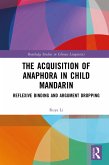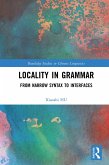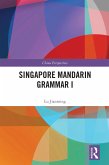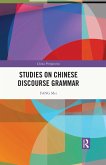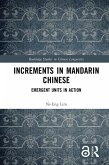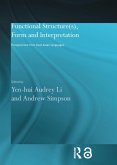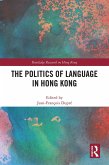Ruya Li
The Acquisition of Anaphora in Child Mandarin (eBook, ePUB)
Reflexive Binding and Argument Dropping
42,95 €
42,95 €
inkl. MwSt.
Sofort per Download lieferbar

21 °P sammeln
42,95 €
Als Download kaufen

42,95 €
inkl. MwSt.
Sofort per Download lieferbar

21 °P sammeln
Jetzt verschenken
Alle Infos zum eBook verschenken
42,95 €
inkl. MwSt.
Sofort per Download lieferbar
Alle Infos zum eBook verschenken

21 °P sammeln
Ruya Li
The Acquisition of Anaphora in Child Mandarin (eBook, ePUB)
Reflexive Binding and Argument Dropping
- Format: ePub
- Merkliste
- Auf die Merkliste
- Bewerten Bewerten
- Teilen
- Produkt teilen
- Produkterinnerung
- Produkterinnerung

Bitte loggen Sie sich zunächst in Ihr Kundenkonto ein oder registrieren Sie sich bei
bücher.de, um das eBook-Abo tolino select nutzen zu können.
Hier können Sie sich einloggen
Hier können Sie sich einloggen
Sie sind bereits eingeloggt. Klicken Sie auf 2. tolino select Abo, um fortzufahren.

Bitte loggen Sie sich zunächst in Ihr Kundenkonto ein oder registrieren Sie sich bei bücher.de, um das eBook-Abo tolino select nutzen zu können.
The Acquisition of Anaphora in Child Mandarin explores how Mandarin-speaking children's interpretation of the reflexive ziji and their use of null arguments can be understood under the notions of locality and prominence.
- Geräte: eReader
- mit Kopierschutz
- eBook Hilfe
Andere Kunden interessierten sich auch für
![The Acquisition of Anaphora in Child Mandarin (eBook, PDF) The Acquisition of Anaphora in Child Mandarin (eBook, PDF)]() Ruya LiThe Acquisition of Anaphora in Child Mandarin (eBook, PDF)42,95 €
Ruya LiThe Acquisition of Anaphora in Child Mandarin (eBook, PDF)42,95 €![Locality in Grammar (eBook, ePUB) Locality in Grammar (eBook, ePUB)]() Xiaoshi HuLocality in Grammar (eBook, ePUB)42,95 €
Xiaoshi HuLocality in Grammar (eBook, ePUB)42,95 €![Singapore Mandarin Grammar I (eBook, ePUB) Singapore Mandarin Grammar I (eBook, ePUB)]() Lu JianmingSingapore Mandarin Grammar I (eBook, ePUB)42,95 €
Lu JianmingSingapore Mandarin Grammar I (eBook, ePUB)42,95 €![Studies on Chinese Discourse Grammar (eBook, ePUB) Studies on Chinese Discourse Grammar (eBook, ePUB)]() Fang MeiStudies on Chinese Discourse Grammar (eBook, ePUB)52,95 €
Fang MeiStudies on Chinese Discourse Grammar (eBook, ePUB)52,95 €![Increments in Mandarin Chinese (eBook, ePUB) Increments in Mandarin Chinese (eBook, ePUB)]() Ni-Eng LimIncrements in Mandarin Chinese (eBook, ePUB)42,95 €
Ni-Eng LimIncrements in Mandarin Chinese (eBook, ePUB)42,95 €![Functional Structure(s), Form and Interpretation (eBook, ePUB) Functional Structure(s), Form and Interpretation (eBook, ePUB)]() Functional Structure(s), Form and Interpretation (eBook, ePUB)0,00 €
Functional Structure(s), Form and Interpretation (eBook, ePUB)0,00 €![The Politics of Language in Hong Kong (eBook, ePUB) The Politics of Language in Hong Kong (eBook, ePUB)]() The Politics of Language in Hong Kong (eBook, ePUB)42,95 €
The Politics of Language in Hong Kong (eBook, ePUB)42,95 €-
-
-
The Acquisition of Anaphora in Child Mandarin explores how Mandarin-speaking children's interpretation of the reflexive ziji and their use of null arguments can be understood under the notions of locality and prominence.
Dieser Download kann aus rechtlichen Gründen nur mit Rechnungsadresse in A, B, BG, CY, CZ, D, DK, EW, E, FIN, F, GR, HR, H, IRL, I, LT, L, LR, M, NL, PL, P, R, S, SLO, SK ausgeliefert werden.
Produktdetails
- Produktdetails
- Verlag: Taylor & Francis eBooks
- Seitenzahl: 248
- Erscheinungstermin: 10. Mai 2024
- Englisch
- ISBN-13: 9781315281032
- Artikelnr.: 70215716
- Verlag: Taylor & Francis eBooks
- Seitenzahl: 248
- Erscheinungstermin: 10. Mai 2024
- Englisch
- ISBN-13: 9781315281032
- Artikelnr.: 70215716
- Herstellerkennzeichnung Die Herstellerinformationen sind derzeit nicht verfügbar.
Ruya Li is Professor of Linguistics at the Institute of Linguistics, Tianjin Normal University.
List of Figures
List of Tables
Acknowledgements
About the Book
List of Abbreviations
Introduction
The Reflexive Binding
The Null Arguments
The Acquisition of Locality and Prominence
The Organization of the Book
1 Theories of Reflexive Binding and Pro-Drop
1.1 Introduction
1.2 Reflexive Binding
1.2.1 The Properties of Ziji
1.2.2 The Syntactic Analyses of Blocking Effect and Subject-Orientation Effect
1.2.3 The Self-Ascription Theory
1.2.4 The Logophoric Analysis
1.2.5 The Prominence and Locality Theory
1.2.6 The Intermediate Summary
1.3 Null Arguments
1.3.1 The Topic Continuity Condition
1.3.2 The Status of Null Objects
1.4 Theoretical Implications to Language Acquisition
1.4.1 Implications to the Acquisition of Reflexive Binding
1.4.2 Implications to the Acquisition of Argument Dropping
1.5 Summary
Acquisition Studies of Reflexives and Null Arguments
2.1 Introduction
2.2 The Acquisition of Reflexive Binding
2.2.1 The Acquisition of Principle A
2.2.2 LD Binding in Child Chinese
2.2.3 Children's Sensitivity to the Subject-Orientation Effect
2.2.4 The Acquisition of Logophoric Reflexives
2.2.5 Intermediate Summary
2.3 The Acquisition of Null Arguments
2.3.1 The Parametric Analysis
2.3.2 The Root Truncation Hypothesis
2.3.3 The Defective INFL Hypothesis
2.3.4 The Unique Checking Hypothesis
2.3.5 The Bidirectional Growth Hypothesis
2.3.6 The Processing Limitation Hypothesis
2.3.7 The Metrical Template Hypothesis
2.3.8 Intermediate Summary
2.4 Summary
3 Experimental Studies of Reflexive Interpretation
3.1 Introduction
3.2 Study 1: Children's Sensitivity to Blocking Effect
3.2.1 Linguistic Assumptions
3.2.2 Experimental Design and Predictions
3.2.3 Participants
3.2.4 Elicitation Task
3.2.5 Stimuli
3.2.6 Procedure
3.2.7 Coding and Data Analysis
3.2.8 Results
3.2.9 Intermediate Discussion I
3.2.10 Summary of Study 1
3.3 Study 2: Children's Logophoric Interpretation of Ziji
3.3.1 Linguistic Assumptions
3.3.2 Experimental Design and Predictions
3.3.3 Participants
3.3.4 Elicitation Task and Stimuli
3.3.5 Procedure
3.3.6 Coding and Data Analysis
3.3.7 Results
3.3.8 Intermediate Discussion
3.3.9 Summary of Study 2
3.4 Study 3: Children's Choice of Antecedents
3.4.1 Linguistic Assumptions
3.4.2 Experimental Design and Predictions
3.4.3 Participants
3.4.4 Elicitation Tasks and Stimuli
3.4.5 Procedure
3.4.6 Coding and Data Analysis
3.4.7 Results
3.4.8 Intermediate Discussion
3.4.9 Summary of Study 3
3.5 Summary of the Three Studies
4 An Experimental Study of Null Arguments
4.1 Introduction
4.2 Linguistic Assumptions
4.3 Experimental Design and Predictions
4.4 Participants
4.5 Elicitation Task
4.6 Procedure
4.7 Coding and Data Analysis
4.8 Results
4.8.1 Topic Continuity
4.8.2 Animacy Effect
4.8.3 Null Subject-Object Asymmetry
4.9 Discussion
4.10 Summary
5 Feature Valuation and Maturation of Grammar
5.1 Introduction
5.2 The AGR/TNS Omission Hypothesis
5.3 Feature Valuation and Local Domain Defining
5.4 Prominence in Maturation
5.5 Summary
Conclusion
Bibliography
Appendix 1: Test Sentences for Study 1
Appendix 2: Test Sentences for Study 2
Appendix 3: Test Sentences for Study 3
Author Index
Language Index
Subject Index
List of Figures
List of Tables
Acknowledgements
About the Book
List of Abbreviations
Introduction
The Reflexive Binding
The Null Arguments
The Acquisition of Locality and Prominence
The Organization of the Book
1 Theories of Reflexive Binding and Pro-Drop
1.1 Introduction
1.2 Reflexive Binding
1.2.1 The Properties of Ziji
1.2.2 The Syntactic Analyses of Blocking Effect and Subject-Orientation Effect
1.2.3 The Self-Ascription Theory
1.2.4 The Logophoric Analysis
1.2.5 The Prominence and Locality Theory
1.2.6 The Intermediate Summary
1.3 Null Arguments
1.3.1 The Topic Continuity Condition
1.3.2 The Status of Null Objects
1.4 Theoretical Implications to Language Acquisition
1.4.1 Implications to the Acquisition of Reflexive Binding
1.4.2 Implications to the Acquisition of Argument Dropping
1.5 Summary
Acquisition Studies of Reflexives and Null Arguments
2.1 Introduction
2.2 The Acquisition of Reflexive Binding
2.2.1 The Acquisition of Principle A
2.2.2 LD Binding in Child Chinese
2.2.3 Children's Sensitivity to the Subject-Orientation Effect
2.2.4 The Acquisition of Logophoric Reflexives
2.2.5 Intermediate Summary
2.3 The Acquisition of Null Arguments
2.3.1 The Parametric Analysis
2.3.2 The Root Truncation Hypothesis
2.3.3 The Defective INFL Hypothesis
2.3.4 The Unique Checking Hypothesis
2.3.5 The Bidirectional Growth Hypothesis
2.3.6 The Processing Limitation Hypothesis
2.3.7 The Metrical Template Hypothesis
2.3.8 Intermediate Summary
2.4 Summary
3 Experimental Studies of Reflexive Interpretation
3.1 Introduction
3.2 Study 1: Children's Sensitivity to Blocking Effect
3.2.1 Linguistic Assumptions
3.2.2 Experimental Design and Predictions
3.2.3 Participants
3.2.4 Elicitation Task
3.2.5 Stimuli
3.2.6 Procedure
3.2.7 Coding and Data Analysis
3.2.8 Results
3.2.9 Intermediate Discussion I
3.2.10 Summary of Study 1
3.3 Study 2: Children's Logophoric Interpretation of Ziji
3.3.1 Linguistic Assumptions
3.3.2 Experimental Design and Predictions
3.3.3 Participants
3.3.4 Elicitation Task and Stimuli
3.3.5 Procedure
3.3.6 Coding and Data Analysis
3.3.7 Results
3.3.8 Intermediate Discussion
3.3.9 Summary of Study 2
3.4 Study 3: Children's Choice of Antecedents
3.4.1 Linguistic Assumptions
3.4.2 Experimental Design and Predictions
3.4.3 Participants
3.4.4 Elicitation Tasks and Stimuli
3.4.5 Procedure
3.4.6 Coding and Data Analysis
3.4.7 Results
3.4.8 Intermediate Discussion
3.4.9 Summary of Study 3
3.5 Summary of the Three Studies
4 An Experimental Study of Null Arguments
4.1 Introduction
4.2 Linguistic Assumptions
4.3 Experimental Design and Predictions
4.4 Participants
4.5 Elicitation Task
4.6 Procedure
4.7 Coding and Data Analysis
4.8 Results
4.8.1 Topic Continuity
4.8.2 Animacy Effect
4.8.3 Null Subject-Object Asymmetry
4.9 Discussion
4.10 Summary
5 Feature Valuation and Maturation of Grammar
5.1 Introduction
5.2 The AGR/TNS Omission Hypothesis
5.3 Feature Valuation and Local Domain Defining
5.4 Prominence in Maturation
5.5 Summary
Conclusion
Bibliography
Appendix 1: Test Sentences for Study 1
Appendix 2: Test Sentences for Study 2
Appendix 3: Test Sentences for Study 3
Author Index
Language Index
Subject Index

